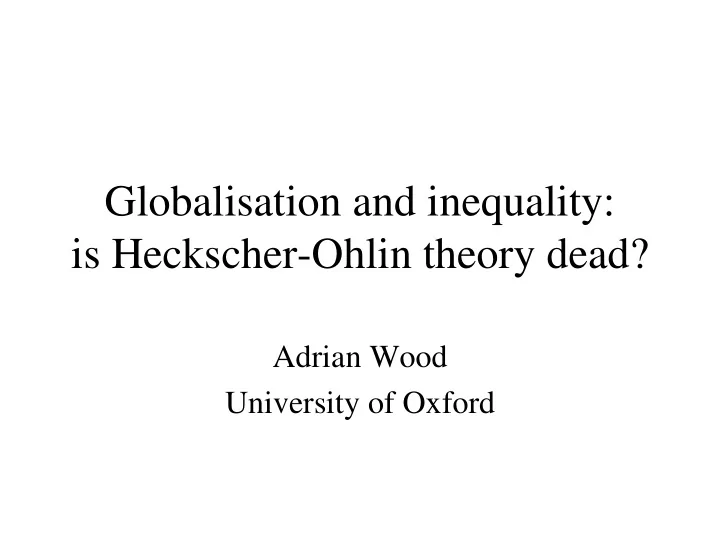

Globalisation and inequality: is Heckscher-Ohlin theory dead? Adrian Wood University of Oxford
Globalisation → inequalities??!! • Thirty years of research – and heated debate • Heckscher-Ohlin: initial basis, now sidelined – ‘Stolper-Samuelson is dead’ (Davis & Mishra) • Preview of conclusions of this talk: • Broad HO theory necessary but insufficient • Narrow HOS model can often be misleading • Focus of talk: (a) intra-country inequality, (b) South, (c) fragmentation of production
In the beginning … • Two factors (skilled and unskilled workers), a skill-scarce South, and globally mobile capital • Fall in trade barriers causes South to specialise in export of labour-intensive manufactures • Unskilled wage rises, relative to skilled wage and in real terms • Broad HO factor demand and supply story • Precise HOS relationship between changes in goods prices and in factor prices
Consistent with evidence? • Most research done on the North (where HO looked consistent in 1980s – but contested) • East Asia in 1960s-70s was also consistent • Latin America in 1980s-90s: skill premia up • Other S countries: growing body of evidence (but always serious identification problems) • Skilled wage premia: rose in most countries • Unskilled real wages: majority (?) of rises
HO-compatible explanations • Not all developing countries are skill-scarce – Upper-middle income L Am > world average • Split unskilled between Bas-eds and No-eds – Export-oriented mfg requires literate workers – Three skill groups (but not quite as in WIOD) • Natural resources (land) another broad factor – In land-abundant countries, unskilled labour loses – Need land to explain S (but WIOD focus on mfs)
What HO was unable to explain • Falls in relative unskilled wage in some low- income, literate, land-scarce countries • Falling relative + rising real unskilled wages • More employment shifts within sectors than between sectors (even quite disaggregated) • Plus two inconsistencies with narrow HOS: • Absence of expected goods price movements • Factor prices varying with factor endowments
Skill-biased transfer of technology • Better, cheaper producer goods or more access to expert foreign buyers, sellers, investors • Best world technology is more skill-intensive • Logical explanation of most HO discrepancies (two broad ones and missing price changes) • Not much directly supporting micro evidence • Heterogeneous/exporting firms micro research focuses on a different mechanism
Skill-biased transfer of activities • New (locally) goods + processes in the South • Transfer could be of all the relevant activities • But increasing fragmentation of production + more trade in intermediates (WIOD focus) • Another explanation of the HO discrepancies – new activities more skill-int than national average • But could also pull wages in the HO direction – new activities less skill-int than national average
HO and fragmentation connected? • On quantity side, yes for broad HO with only minor modifications: countries export goods whose local value added content is relatively intensive in their relatively abundant factors – Difference is empirical (WIOD), not theoretical • Not so clearly for HOS, since if factor prices equalised, no incentive for fragmentation • HOS also damaged by disappearance of link between prices of goods and of factors – Harder to theorise/measure prices of activities
Fragmentation a HO mechanism? • Yes, as regards role of ‘transport’ costs: • Must be low for outsourcing, HO driver, and makes specialisation match endowments • No, as regards role of ‘cooperation’ costs: • Arrival of new activities requires a non-HO driver: international mobility of know-how • Effects on factor prices depend on levels and changes of transport costs, cooperation costs and endowments of S country concerned
What about capital? • Debate about its mobility (Feldstein-Horioka) – and barriers exist in many Southern countries • High and rising capital share (P/Y) in WIOD • Is it rising K/Y ( Δ K/L > Δ Y/L) or rising P/K? • Either way, seems bad for income inequality – because ownership of capital is concentrated • How much of the profit stays in the South? • Who in the South benefits from the profits?
Some conclusions • Broad HO theory is alive and in good health • Narrow HOS model is seriously challenged • Full account of globalisation and inequality requires more than (even broad) HO theory • HO (and other) theory should inform further development of WIOD work • WIOD already a most useful basis for theory, empirical research and policy analysis
Recommend
More recommend